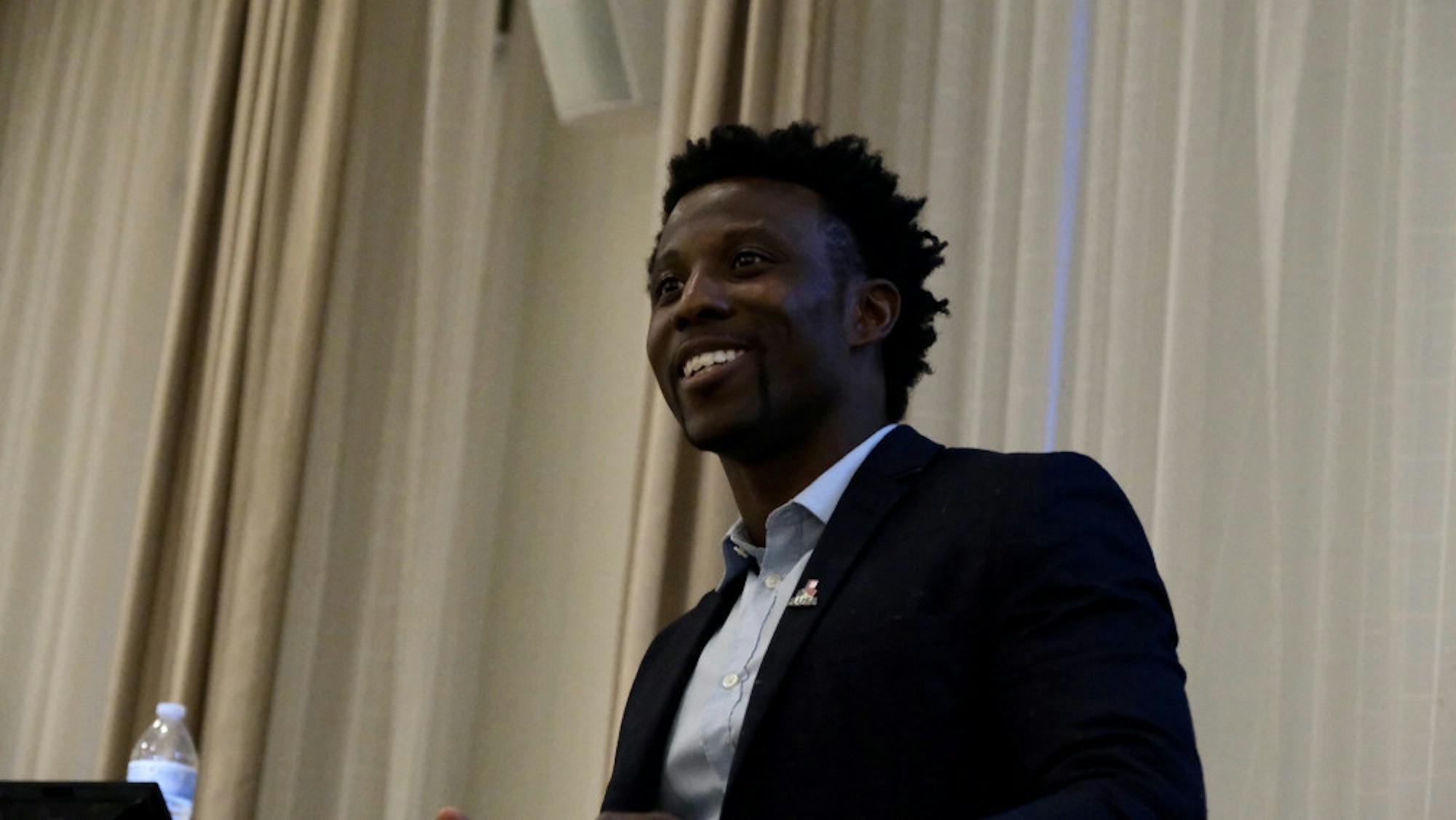The Tufts University Prison Initiative of Tisch College (TUPIT) held its second symposium on Oct. 3 and 4, titled “Engaging Justice: Inside/Outside Prison.” Hosted in the Aidekman Arts Centeron Thursday and in the Curtis Hall Multipurpose Room on Friday, the symposium presented panels, workshops and a film screening.
Tufts students, faculty, local organizers, professionals and formerly incarcerated individuals spoke on their experiences. The event aimed to engage the Tufts community with the impacts of education in prison and the issues surrounding mass incarceration, according to the TUPIT webpage.
Throughout the year, the TUPIT program, directed by Hilary Binda, a senior lecturer in Visual and Critical Studies, focuses on connecting Tufts students and faculty with incarcerated individuals to provide equitable access to higher education.
The symposium was organized by undergraduate students Claudia Guetta and Nora Maetzener. Both credit the TUPIT programs for their initial involvement with incarceration issues.
TUPIT initiatives include a national chapter of the Petey Greene tutoring program, and an “Inside-Out” course with Tufts students and Tufts incarcerated students in the same class, according to Maetzener, a senior.
Since the last symposium in February 2018, TUPIT has expanded its initiatives to include a Bunker Hill Community College three-year associate degree program with Massachusetts Correctional Institute at Concord (MCI-Concord) and the Pathways to Tufts program, which facilitates the hiring of formerly incarcerated people, Binda said in an email to the Daily.
The symposium began with a panel of Tufts students and faculty sharing their experiences with the Inside/Outside Program and the Tufts program at MCI-Concord.
Guetta, a sophmore, spoke of taking the “Inside/Out” course titled Mass Incarceration and the Literature of Confinement. She was one of 10 students that traveled to Concord to take a course with a Tufts professor and 10 incarcerated peers, an experience she found impactful.
“I was going to this prison and I was learning with them, rather than learning about the criminal justice system in a sociology class,” she said.
Kim Ruane, a math professor, believed that teaching in the MCI-Concord program affected her both personally and professionally.
“Seeing people that didn’t come from the background you came from — how they experience education — you can really learn from that,” she said.
According to Guetta and Maetzener, planning for the symposium started at the beginning of the 2018 spring semester. The student co-organizers fundraised, sought out co-sponsors for the event and contacted the keynote speaker Stanley Andrisse, the founder and director of From Prison Cells to Ph.D. Tisch College, Concord Prison Outreach, Partakers Program and Petey Greene Program sponsored the symposium.
The event was held on Thursday from 1 p.m. until 9 p.m., and will be held on Friday from 10 a.m. until 4:30 p.m.Friday’s symposium will feature letters read from the Tufts Concord students and perspectives from formerly incarcerated individuals who did college while in prison, according to Binda.
Andrisse spoke yesterday in a talk titled "Education Over Incarceration," emphasizing the effect of education on recidivism rates and speaking of his own experience in the criminal justice system.
Andrisse opened the talk with statistics on the state of mass incarceration in the U.S., stating that 700 per 100,000 people in the United States are incarcerated, the highest rate in the world. He said the United States' prison population makes up 25% of the world's prison population, despite the fact that the U.S. population makes up only 5% of the world population.
Around a third of formerly incarcerated people hold a GED, according to the U.S. Department of Justice. Andrisse said around 75% of these individuals received their GEDs while incarcerated. However, he stressed that only 4% of formerly incarcerated individuals hold a college degree, compared to a third of the American population.
Andrisse then described his experience in the criminal justice system, saying that, as a child growing up in Ferguson, Mo., he began dealing drugs and had encounters with the police from a young age. In his 20s, Andrisse said he faced 20 years to life in prison for drug distribution. Andrisse described his experience in court with a prosecutor who painted him as a "career criminal."
Andrisse said that he was arrested with two other black people and two white people. According to Andrisse, the white individuals did not get prison sentences.
"I can only imagine that, I guess the prosecutor saw hope in their whiteness, and hopelessness in my blackness," he said.
Throughout the talk, Andrisse similarly emphasized the difference in treatment between people of color and white people in the criminal justice system. While one in 17 white men will experience prison time in their lifetimes, one in three black men will go through prison, Andrisse said.
After leaving prison, Andrisse was eventually able to go back to college at Saint Louis University, eventually earning his Ph.D. in endocrinology. He teaches at both Howard University and Johns Hopkins University.
Andrisse closed his talk by emphasizing the importance of increasing access to education for incarcerated individuals, citing U.S. Justice Department statistics that education reduces recidivism rates by 43%.
In addition to the part of the symposium that occurred on the Tufts campus, Andrisse also spoke to incarcerated individuals at MCI-Concord on Thursday, according to Guetta.
Regarding the impact of the event, Binda said, “Getting involved in at least thinking about the issues raised by this work and these people is critical and should be a central part of your college education. Getting involved in doing more than thinking about justice is equally critical.”
Austin Clementi contributed reporting to this article.
TUPIT hosts 2nd annual symposium

Stanley Andrisse, the founder and director of From Prison Cells to Ph.D., talks about the importance of hope in the Alumnae Lounge on Oct. 3.





